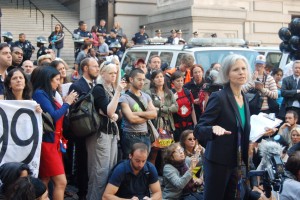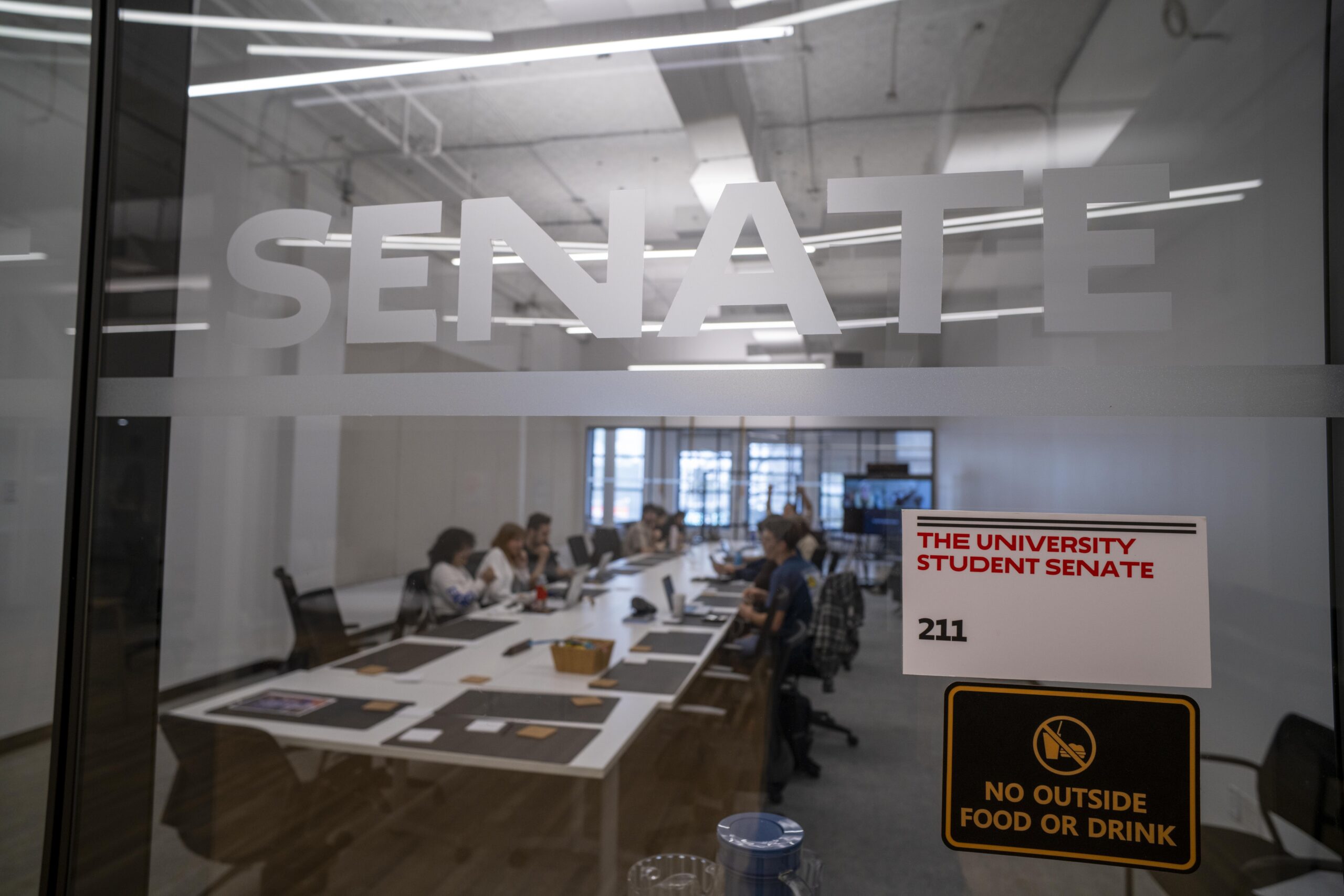[soundslides width=”620″ height =”533″ id=”2685″]
Here is the first of three installments.
It was a Monday, September 17, and it started earlier than I would have liked it to, as I ran out of my house in New Jersey around 8 a.m., jumped into my car, and flew bleary-eyed down the Palisades parkway. I was trying to arrive in a timely manner – never my strong suit – for a short interview I had coordinated the night before with Jill Stein’s personal assistant. Jill Stein is running for president this election season, but that information may be over much of the public’s head. She was one of many scheduled to speak at the Bowling Green on the one-year anniversary of Occupy Wall Street.
Stein is the Green Party candidate, and has not only been very active within Occupy, but has shown support for many populist cries, even marching with Chicago’s teachers while it seemed the fate of many jobs, and the education of many children, were up in the air. Her and running mate Cheri Honkala’s platform for a Green New Deal really caught my attention, and apparently the attention of many progressives across the country, who will be casting votes for Stein in at least 43 states this November, rather than for Obama as they likely did four years ago.
My timing however really cut it close as usual. After going through the mayhem that is finding a parking spot near the New School, I jumped on the subway and headed for Wall Street. Preparing what questions I had for her, I began to wonder if my rushing was all for naught. These Occupy events can be as planned as ever, but when push comes to shove (pun intended), the informal nature of the whole thing tends to throw a lot of curveballs. Nevertheless, I climbed up the stairs and onto Broadway, and made my way down to the Bowling Green, where the Eco Zone was gathered, and Jill had yet to speak.
There was a crowd of hundreds gathered in front of the stairs of The National Museum of the American Indian, with noticeable police presence, and an assembly of some sort underway. The charging bull was completely barricaded. Small acts were brought to the middle of the circle, powerful calls to climate action were made, and roars of excitement filled the fresh morning air. I quickly spotted Jill’s signature cropped silver hair bobbing up from the crowd, across the assembly circle from me. As a slightly disheveled, but very professional sounding young man in a suit made similar calls to action, he began an introduction for Jill. This would not be the last I saw of him, as we would meet up later in the day, under less favorable circumstances.
Standing next to her running mate, smiles all around, Stein took front and center and threw up a peace sign, receiving hearty applause in response. Instead of going the route of public policy, she talked about how important and essential Occupy’s well-being is to that of this country. And in classic Occupy fashion, she was only given the same two to three minutes that everyone else had to speak, and then it was time for another group to have their turn.
In a more private conversation, Stein proclaimed that, “We bailed out the bankers that got us into this mess, students deserve to be bailed out as well. They weren’t the problem that started this mess, they’re the victims.” She raged against a political economy that was made “by and for the 1%,” and offered her Green New Deal, a comprehensive jobs act that would help the country adapt to climate change. Stein described it as “a convergent solution” that could solve the “economic emergency, jobs emergency, the climate emergency, and the war emergency.”
Yet, after half an hour of this mini-press conference business, I wasn’t satisfied. She was rushed off eventually, and the story wasn’t really there. In truth, it seemed like she wasn’t trying to give the profile of herself that I was looking for, and instead simply show her solidarity for these kinds of social movements, and maybe gain a few votes as collateral. Either way, I felt it was time to move on, and dig deeper into the day.
By around noon there had already been roughly 100 arrests, according to the National Lawyers Guild. These happened between direct actions, sit-ins, and intersection jams carried out by the four major blocs that had organized for the day: the Eco Zone, Debt Zone, Education Zone, and the 99% Zone. Reports from the financial district told of isolated actions at the US Bankruptcy Court, Emblem Health, TD Ameritrade, Goldman Sachs, Bank of America, and many more. On Water Street, membe

rs of the Direct Action working group streamed into JP Morgan Chase, read a letter to the president aloud, then proceeded to throw confetti and bouncy balls everywhere. NYU professor Andrew Ross of Occupy Student Debt was arrested at this action, of which I have his first-hand confirmation from later that day.
There were arrests of dozens made at each of these actions, all done in a seemingly different fashion than usual. Instead of the standard big-scale cattle round-up after two warnings that marked year one of Occupy, the NYPD’s tactics had now evolved to random “snatch and grabs” that set an example for the rest of the participants of that particular action. A major difference here, according to many accounts, was that there were oftentimes effectively no warnings, a strategy of questionable legality. Members of Occupy Faith were arrested at the charging bull, in an apparent attempt at a sit-in. The debt and education blocs came together at Broad and Water to not only jam an intersection, but actually stop a police truck from moving.
By noon, a General Assembly had formed in City Hall Park, at which there were many of the larger working groups present. Reports say that between 1,500 and 2,000 people attended the meeting. I was over at Zuccotti Park, the old stomping grounds, where similar crowds were gathered. This was not necessarily Zuccotti in its prime, but perhaps that was because the blocs had purposefully been spread out across Lower Manhattan. You still had your necessary staples: the raving drum circle, a barely audible popular assembly, vendors showing true capitalist initiative by lining the edges of the park with food trucks – it’s as if November 15 of last year had never even happened.
Except all you had to do was look at the perimeter and see the guarded barricades where police were letting people in like it was some sort of a festival, and you would instantly be reminded that the game had surely changed. I sat and soaked up the sounds and smells that sometimes play like background noise in my head. The constant drumming brings back weird memories that seem like long-past dreams, and bleed into late nights of last September and October, when the hope was palpable. That hope was not the “hopey changey” kind that had been sold like one of the best public relations campaigns ever, but rather the kind of hope that what was going on there was actually going to change the way of things.
And it did. Why, even Mitt Romney has now come up with his own imagery of the 47% – not the kind of influence most Occupiers were hoping to have, but nonetheless, it is undeniably true that Occupy Wall Street has changed the public discourse, not only in the U.S., but around the world, about the authoritarian state-corporate relationship, social inequality, and many other plagues that affect the everyday lives of the masses. Unfortunately, some working groups did not make it to see the light of the second year, and were instead caught up in the political correctness of prefigurative politics, which as many now know, can have its debilitating and empowering extremes.
Over the past year, there has been a sprawling range of debates that have come and gone, some of which are still being argued over. For a moment, the focus was on the nonviolent purists trying to manage their commitment to the movement while hearing about and seeing the sometimes violent, sometimes helpful actions and reactions of the black bloc anarchists. There were many existential moments like this. Some even still question the movement’s accessibility (realistically) to the average working class person. On the topic of organization, should organizers focus on large, one-off events like this year’s May Day? It was an impressive convergence of labor unions, immigrant groups, kitchens, teach-ins, and massive marches (Occupy Guitarmy included) that marked a hugely productive day, despite the widely unfulfilled call for a massive general strike.
“Productive” is the keyword in question here. Is it productive to focus organizational energy around events that will attract sufficient media attention, or is it best to work on impressive shows of direct action – like Occupy Foreclosed Homes – which were able to actually stop banks, police, and construction crews from foreclosing homes in Minnesota, and they were stopped for good. Or like Occupiers near UC Berkeley, who seized a tract of high-quality land for agricultural use that was set to be demolished so that a proposed Whole Foods parking lot could be paved over it (oh, the irony!). They maintained that occupation for at least a month, and had planned on distributing the food grown there freely to the local public. They are now in collaboration with the university on how to best utilize the land, and Whole Foods has withdrawn its application for construction. These were all good ideas, yet with all the pressure that comes with committing yourself to such a movement, many cracked and fell by the wayside since the evictions that took place last fall. And after all the news coverage that amounted to nothing but a sad showing of journalistic inquiry, we have the presidential candidates slyly referring to themes of discussion that Occupy set in motion, but never once directly addressing them.
What is also out there now are the countless videos on YouTube of mostly innocent protesters being pepper sprayed at point blank, beaten like neglected animals, and even hit with projectiles from particularly militant departments. The subject of police brutality, in addition to the “goals” and “demands” of Occupy, was also quite poorly covered by major news networks. The message that got out was that you should probably steer clear of anyone even just talking about occupying anything, if you didn’t want to get yourself arrested. It was criminalization at its most dystopian level, that of democratic action. When a group rallies in a public park to organize a solidarity march, to in turn rally the community together over common causes, this in a vacuum is a most civil action. When put in the context of an authoritarian state-corporate complex, it is a much different story. Suddenly you’re the radical, not the speculators that are making bets on home mortgages defaults over on Wall Street. And to a certain extent, what the media said about the hairy atmosphere that surrounds most occupations is true, but only because the police are constantly reinforcing whatever message is out there, and it’s only natural. A major opening in discourse that Occupy has exposed are the centers of control that dictate what kind of jobs are out there and who you’re voting for. Nothing is more painstakingly obvious than when you see an incident of police brutality five feet in front of you.







Leave a Reply